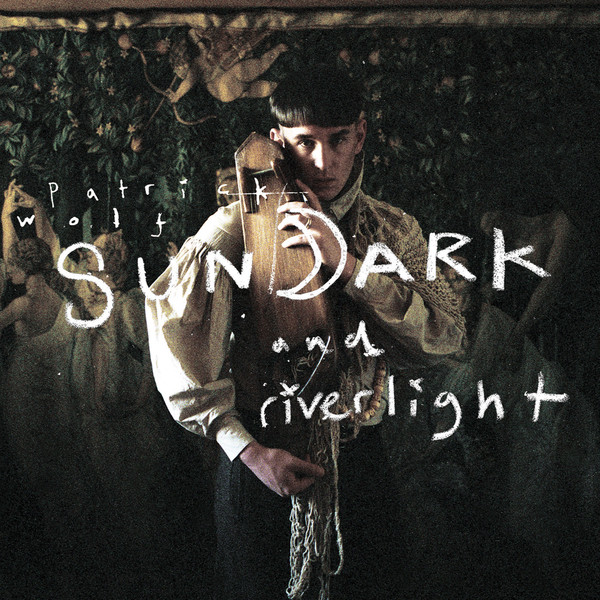
Nobody does maximalism like Patrick Wolf. Calling his music theatrical is accurate but only just; if the stage is the metaphor, Wolf’s albums call for massive prosceniums, with hundred-strong casts, meticulous set pieces, and props flung in from the wings. The aesthetics may vary, from Lycanthropy’s assemble-at-home crafting to The Bachelor’s repurposed metalwork to Lupercalia’s lavish polish, but the scope is always titanic. If you’re a fan, this is likely why: Wolf spares no sound, vocal gnash, or string flourish if there’s emotional or narrative payoff to be had. If you’re not, there’s probably nothing more Wolf could be doing to change your mind. Maybe that’s why the main decision he made on his 10th-anniversary album, Sundark and Riverlight, was to do so much less.
Sundark and Riverlight is a double album containing re-recorded versions of Wolf’s songs. One disc designated for troubled songs and one for happier ones. In practice, this sorts The Bachelor to the front and Lupercalia to the sunny back porch. It isn’t quite a greatest-hits compilation, though it’s mostly singles and fan favorites. Nor is it precisely an acoustic album, though that’s mostly how these songs differ. It’s more like a retcon, or as Wolf calls it, a make-under: stripping the old material of its frippery to reveal how, Wolf has said, it was meant to sound. “There was a conscious rebellion on this album against the digital age of auto-tune and mass produced electronic landfill music,” Wolf wrote to accompany the album’s release, echoing comments he’d made around the release of Lupercalia. It’s a curious statement from an artist who’s never much relied on or even acknowledged Auto-Tune and one whose music has been thickly electronic (if not exactly mass-produced) since album one. But it’s benign. Wolf’s hardly the first to anchor this rationale to an unplugged album, nor is he even alone this month. (Tori Amos’s Gold Dust, the same idea in the same broad genre, came out within the week.) There’s a certain cachet to baroque recordings that New Romantic synthpop doesn’t have; it’s a play to redefine oneself not as a singer-songwriter but a singer-composer.
If only more composing went on. If this is how Wolf’s songs truly look, Sundark and Riverlight is like the thumbnail version: everything compressed, details lost. What might sound cavernous with the right acoustics sounds merely pleasant on recording, taking angst-wracked songs and turning them into something more suited to catches of melodies you’d hear passing a storefront. In these thinner arrangements, Wolf’s voice– among his greatest assets– sounds overegged, and he knows it; his howls and growls are mostly subdued, as if he’s trying to keep it down for the very nice PA lady who just told everyone to turn off their cell phones.
This works when the songs were orchestral ballads already (“London”), or when the details lost cluttered what might as well have been orchestral ballads (“Teignmouth”, “Wind in the Wires”). It works for much of the Lycanthropy material, because if you forget Wolf’s statements, it’s easy enough to imagine this really is how these songs sounded inside his head as a teenager. And it works when Wolf’s composing at his normal scale, like “Bluebells”, which gets darker when written for cello and piano, or “The Libertine”, whose startled-orchestra arrangement is the only unquestionable improvement here.
What’s less successful is when Wolf takes exuberant songs and tranquilizes them. If you played the Sundark version of “Oblivion” for someone uninitiated, then the original, they’d think the first was the demo. A lone guitar picks through the bones of The Bachelor’s original arrangement; you’d expect the violins at least might have stayed, being both rustic and frantic, but no. And Wolf’s vocals, though not tentative, come off like laying guide marks for where the full version would insert guttering or conviction or Tilda Swinton. “Vulture”, another Bachelor track, replaces the gnashing percussion, panting strings, and general masochistic frenzy of the original with sedate piano pleasantries; there’s no blood left in its dead meat. Lupercalia fares little better. “Together” takes two ideas from the original (the seconds-long classical guitar flourish at the beginning and the curtsying strings at the end) and deflates everything else. “House” excises all the rejoicing strings and most of the joy of the original; it’s like a midday nap the day after a besotted honeymoon, which is fair enough as an interpretative choice but far less interesting.
Sometimes the changes are just baffling. “Bermondsey Street” takes a song that worked because of its simplicity, its word-precise juxtaposition of two affairs, and smothers it with noodling spoken-word interludes; it’s the exact opposite of what Wolf said he was trying to do. If the goal of Sundark and Riverlight was to prove Wolf’s repertoire has songwriting merit beyond the layers of mythology and biography and reinventions, it’s an unqualified success; on its own, every arrangement is entirely thoughtful and praiseworthy. It just wasn’t necessary. These songs can make it alone, but they could be– and have been– so much better.
